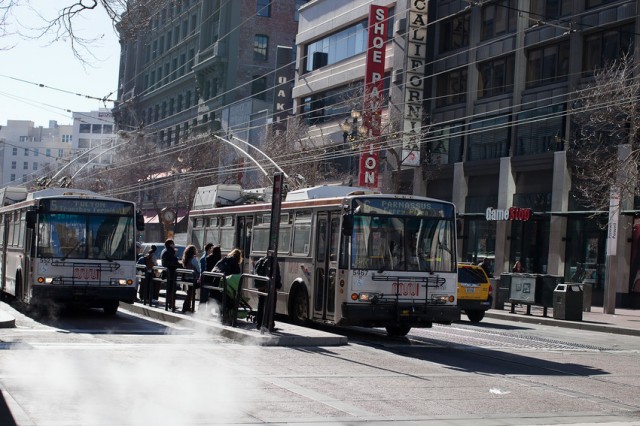"Google is demonstrating with real action and real resources that they are a true partner in addressing our city's affordability crisis for lower and middle-income families," Lee said.
Mountain View-based Google and other local technology companies have come under criticism recently because of concerns over gentrification and rising costs of living in San Francisco, as well as for problems related to the companies' commuter buses that could soon begin using Muni bus stops for a small fee charged by the city.
Activists have blocked the tech buses on several occasions in and around the city.
Supervisor David Campos, an initial advocate for the Free Muni for Youth program and one of the critics of the so-called Google buses, said in a statement that the company's donation is "a good first step."
"We need further collaboration to support more community-driven solutions to the displacement crisis,” Campos stated.
Campos said, "I'm looking forward to working with the tech industry in the future on other important issues like housing, jobs and tenant protections."
According to the city, "Preliminary data shows that Free Muni for Low Income Youth has had a positive impact on San Francisco’s transportation network. Clipper Card data shows 266,000 more rides by youth Muni riders in May 2013 than in May 2012. Approximately 45 percent of Free Muni for Low Income Youth participants plan to ride public transportation as an adult, while 70 percent would recommend Muni to their friends, according to the San Francisco Unified School District Student Survey results."
Free Muni for All?
KQED's Stephanie Martin spoke with Tommy, a local activist who has been involved in recent Google bus protests.
"It's certainly a good thing because I think the program to make Muni free for youth who are low-income is a good thing, but it's only a beginning," said Tommy. "I would like to see Google and other companies that are using our bus stops chip in enough money to make Muni free for everybody. Because why shouldn't we all benefit from this big economic boom that's happening in this city?
"We certainly have to be inconvenienced by these buses being in the stops and tying up Muni buses, so why shouldn't we all benefit? So, I would say it's good. But let's make our Muni totally free. I think we can aim higher. I think the other companies should be involved as well. I think Google and all the other companies that use the bus stops for their buses could certainly chip in enough or donate enough to make Muni free."
Martin also interviewed Jessica Lehman, executive director of Senior and Disability Action on Google bus funding for low income youth:
"I think there's a bigger question of what are they doing to support a public system in a city that they are working in and benefiting from. There's a reason that there have been all of these actions on Google buses. It's a question of what kind of city do we want and who do we want to have access to services.
"The next step is free Muni for seniors and people with disabilities. Especially at a time right now when rents are skyrocketing and people are living on Social Security income or are low-income from any number of sources … where it's really hard for people to choose between paying rent, paying for food and medicine and transportation. Transportation shouldn't be a luxury.
"This is really about what kind of community we want. And I think we want a community where all of our folks, youth, seniors, people with disabilities, people of color, people living in every neighborhood can get around town easily and affordably -- so that people can be active in the community."
